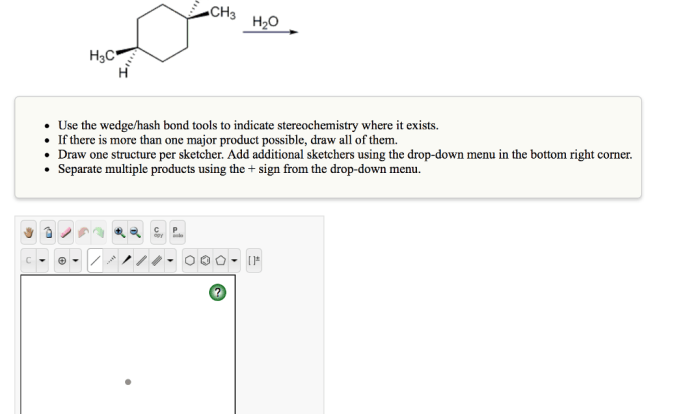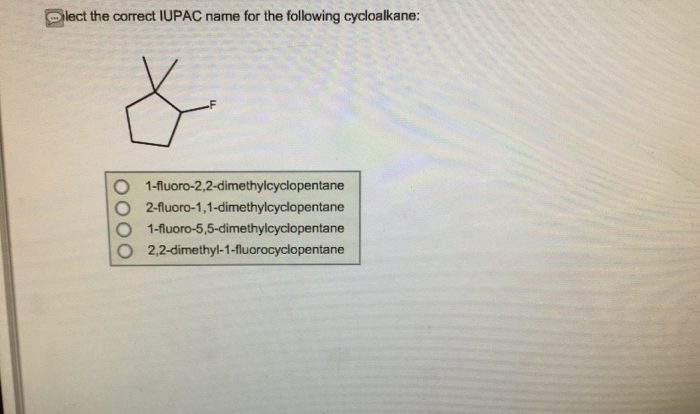Organic chemistry john mcmurry 9th edition – Embark on an enthralling journey into the realm of organic chemistry with John McMurry’s 9th edition, a comprehensive guide that elucidates the fundamental principles, reactions, and applications of this captivating field.
Delve into the intricate structure and bonding of organic molecules, unravel the mechanisms driving their reactivity, and master the art of organic synthesis. Witness the transformative power of organic chemistry in everyday life, from pharmaceuticals to materials science, and explore the cutting-edge advancements shaping its future.
Organic Chemistry Concepts
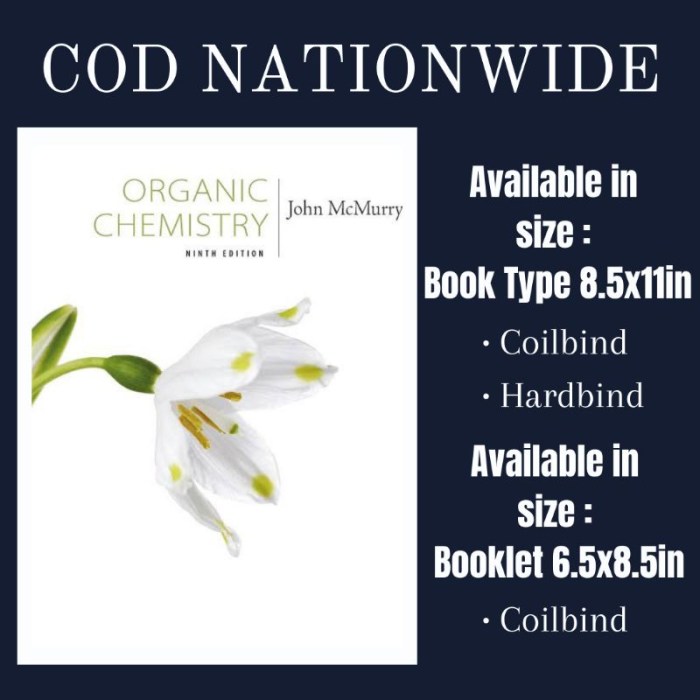
Organic chemistry is the study of the structure, properties, and reactions of carbon-containing compounds. Carbon is a unique element that can form a vast array of compounds with itself and other elements, including hydrogen, oxygen, nitrogen, and halogens.
Organic molecules are the building blocks of all living organisms, and they play a vital role in many industrial processes. Organic chemistry is essential for understanding the chemistry of life and for developing new materials and drugs.
Structure and Bonding of Organic Molecules
Organic molecules are composed of carbon atoms that are bonded together by covalent bonds. Carbon atoms can form single, double, or triple bonds with each other, and they can also form bonds with other atoms, such as hydrogen, oxygen, nitrogen, and halogens.
The structure of an organic molecule determines its properties. For example, molecules with double or triple bonds are more reactive than molecules with only single bonds. Molecules with polar functional groups are more soluble in water than molecules with nonpolar functional groups.
Reactivity of Organic Compounds
Organic compounds react with each other in a variety of ways. The most common types of organic reactions are addition reactions, elimination reactions, and substitution reactions.
Addition reactions involve the addition of one or more atoms or groups of atoms to a double or triple bond. Elimination reactions involve the removal of one or more atoms or groups of atoms from a molecule. Substitution reactions involve the replacement of one atom or group of atoms with another.
Organic Reactions
Types of Organic Reactions
- Addition reactions
- Elimination reactions
- Substitution reactions
- Rearrangement reactions
- Cycloaddition reactions
Mechanisms of Organic Reactions, Organic chemistry john mcmurry 9th edition
The mechanism of an organic reaction is the step-by-step process by which the reaction occurs. The mechanism of a reaction can be determined by studying the reaction products and the intermediates that are formed during the reaction.
The most common type of organic reaction mechanism is the nucleophilic substitution mechanism. In a nucleophilic substitution reaction, a nucleophile (an atom or group of atoms with a negative charge) attacks an electrophile (an atom or group of atoms with a positive charge) and replaces the leaving group.
Factors that Affect the Rate and Selectivity of Organic Reactions
- The concentration of the reactants
- The temperature of the reaction
- The solvent in which the reaction is carried out
- The presence of a catalyst
Organic Synthesis
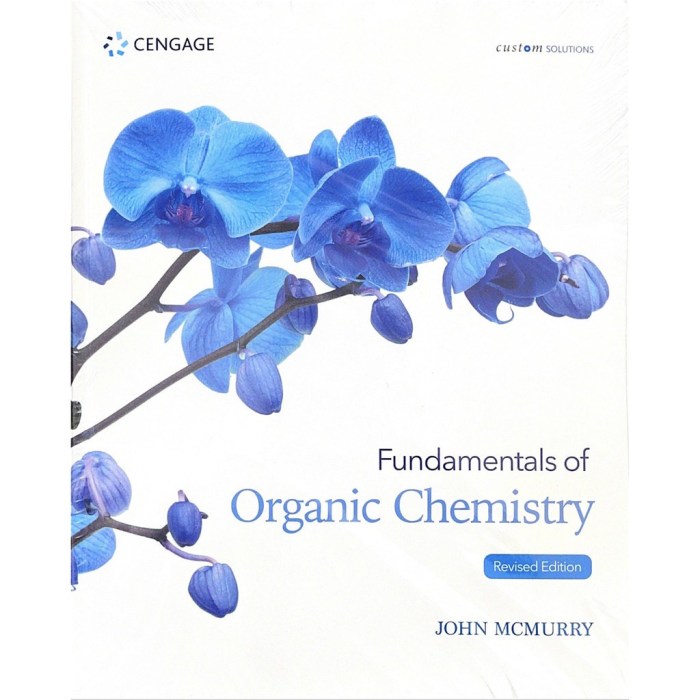
Design of a Synthetic Pathway
The first step in organic synthesis is to design a synthetic pathway. A synthetic pathway is a step-by-step plan for how to convert a starting material into a target molecule.
When designing a synthetic pathway, it is important to consider the following factors:
- The availability of the starting materials
- The yield of each step in the synthesis
- The cost of the reagents and solvents
- The environmental impact of the synthesis
Optimization of Reaction Conditions
Once a synthetic pathway has been designed, the next step is to optimize the reaction conditions. The reaction conditions include the temperature, the solvent, and the concentration of the reactants.
The optimization of reaction conditions can be done by using a variety of techniques, such as:
- Response surface methodology
- Design of experiments
- Artificial intelligence
Challenges and Limitations of Organic Synthesis
Organic synthesis is a challenging and complex process. The main challenges and limitations of organic synthesis include:
- The difficulty of controlling the regioselectivity and stereoselectivity of reactions
- The need for specialized equipment and reagents
- The environmental impact of organic synthesis
Applications of Organic Chemistry: Organic Chemistry John Mcmurry 9th Edition
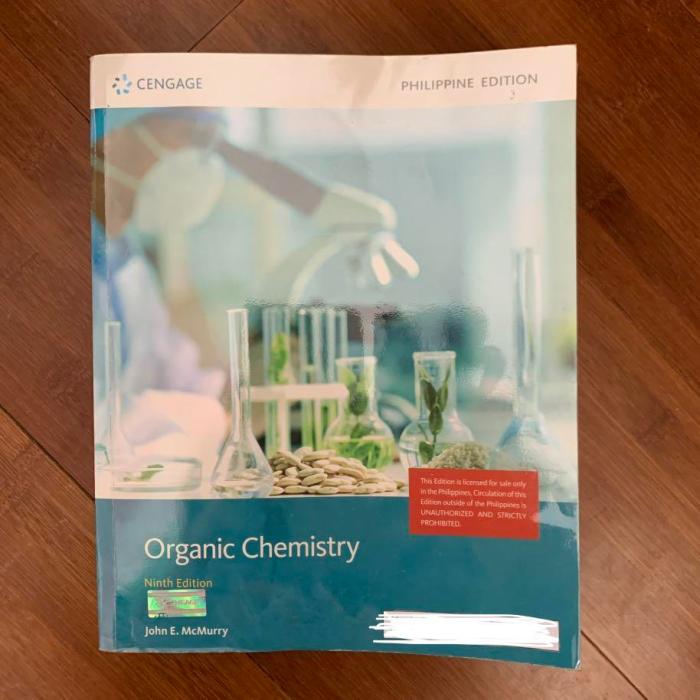
Organic Chemistry in Everyday Life
- Organic chemistry is used in the production of a wide variety of products that we use in our everyday lives, such as plastics, pharmaceuticals, and food additives.
- Organic chemistry is also used in the development of new materials, such as graphene and carbon nanotubes.
Organic Chemistry in the Pharmaceutical Industry
- Organic chemistry is essential for the development of new drugs. Drugs are organic molecules that are designed to interact with specific targets in the body.
- Organic chemists play a vital role in the discovery, synthesis, and testing of new drugs.
Organic Chemistry in Materials Science
- Organic chemistry is used in the development of new materials, such as plastics, polymers, and composites.
- Organic materials are used in a wide variety of applications, such as electronics, transportation, and construction.
Recent Advances in Organic Chemistry
New Synthetic Methods
- The development of new synthetic methods has made it possible to synthesize complex organic molecules more efficiently and selectively.
- New synthetic methods have also made it possible to synthesize molecules that were previously impossible to make.
New Applications of Organic Chemistry
- Organic chemistry is being used to develop new applications in a variety of fields, such as medicine, materials science, and energy.
- For example, organic chemists are developing new drugs to treat cancer and other diseases.
Future Directions of Organic Chemistry
The future of organic chemistry is bright. Organic chemists are constantly developing new methods and applications for organic chemistry.
In the future, organic chemistry will play an even greater role in our lives. Organic chemistry will be used to develop new drugs, materials, and energy sources that will make the world a better place.
User Queries
What are the key concepts covered in John McMurry’s 9th edition?
The 9th edition of John McMurry’s Organic Chemistry comprehensively covers fundamental principles, structure and bonding, reactivity, organic reactions, organic synthesis, applications, and recent advances in the field.
How does the 9th edition differ from previous editions?
The 9th edition features updated content, new examples, and improved pedagogy, ensuring that students have access to the most current and effective learning materials.
What are the benefits of using John McMurry’s Organic Chemistry as a textbook?
John McMurry’s Organic Chemistry is renowned for its clear and engaging writing style, comprehensive coverage, and abundance of practice problems, making it an ideal choice for students seeking a deep understanding of the subject.
